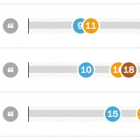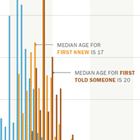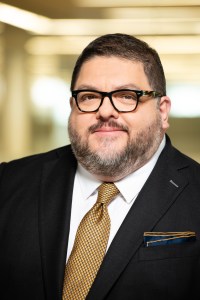Before we launched our first major effort to capture the views and opinions of LGBT adults for our series ‘LGBT in Changing Times,’ we convened a focus group to help inform our approach. In March 2013, we assembled 12 LGBT adults from the Washington, D.C. area: five gay men, three transgender adults, two bisexual men and two lesbians. We asked them about being LGBT in America today.
This is not the first time we’ve used focus groups in our research. We convened focus groups for our recently published report on teens, social media and privacy. And in 2009, we used focus groups with our research about Latino youth. Focus groups help us identify the best questions to ask in a survey and to understand a community’s views better. Here’s a sample of quotes from our LGBT focus group discussion. You can read more voices from the LGBT community we surveyed and add your own in the comments section.
What do you consider yourself to be? How do you see your identity?
I think most of my friends would say that I’m gayer than gay. I definitely identify as a gay man … but it’s just one aspect of many [about me as] I identify as an artist, as a dancer, as a choreographer, so it’s hard to say I identify as just one thing. Gay is a very big part of my life, but it’s not the only thing. 45-year-old gay man
I didn’t really have a sexual identity before [age] 25. I knew I was attracted to women and men and I had sex with women up until 22. [Then], between 22 and 25 I experimented with guys and had full-out relationships with them until I was about 29 and I just, I don’t know what it was about maybe the lifestyle or my culture, and I just, it’s not that I despised it, I just didn’t fit in, really. I didn’t fit anywhere, I didn’t fit in the straight world, I didn’t fit in [the gay world], but I was sexually attracted to both women and men. But it’s not about labels or locking one’s self in one box, but for people who are truly bi, you don’t feel welcome anywhere. So you don’t expose it anywhere. 42-year-old bisexual man
I’m lesbian. Growing up, I didn’t know what it was, all I knew was I saw those rough women that drank too much and stumbled around and no one liked them and they called them “bulldaggers” and no one wanted to be a “bulldagger,” so when I finally found my voice and realized that it was okay, you know, I’m okay. I’m a lesbian all the way, and I love it. I do look at some guys and go like ‘he’s cute,’ and my friends do say I have a little gay man inside of me when it comes to fashion and things like that, but I’m lesbian. 43-year-old lesbian
When I came out last year to my parents, [because of] language barriers I had to tell them that I was gay—“Mom and Dad, Soy gay.” But in my head [because of] my involvement with politics, I identify as queer. [Now] I try not to think about labels, so coming out to my friends was much easier than coming out to my parents, because my friends either knew, speculated, still questioned—it was just there and I took it by the hand and went with it. But with my parents, because of language, it was so much easier for me to tell them I’m gay rather than, “oh, I’m queer,” because that’s something that they can’t really fully understand at this point. 22-year-old queer man
I’ve had this ongoing thing with my mother, as I’m sure everyone has on some level or another. At some point in her road to accepting me for who I am, there’s this: We don’t think of you as [our son] the gay guy, we just think of you as [our son]. And I’m like, right, but you wince when you think about the gay part and that is a part of who I am on the whole. But, at the same time, I don’t think that every heterosexual person thinks of their heterosexuality as a part of who they are. 33-year-old gay man
For myself, knowing at a very young age that I really was not fitting in, I knew clearly that I was born male, but the feelings, the way I looked as a child, all those things were barriers for me. My parents put me in private schools because when I went to the mainstream public schools, the first question that kids would ask is “what is your gender? What are you?” At the time, I was going according to what my mom and dad deemed me. And I had my bouts where I would tell kids I was a girl to alleviate a lot of the harassment and things. Then kids were like, “Well, no, they told me you were a boy” and, then, this whole kind of identity where you fit haunted me for most of my life. Knowing that I was this person that was trapped in this body. So I tried to conform to what people thought I should look like or should be and that was a very unhappy and depressing time in my life. And random people would walk up to me and say, “Wow, you look really confusing.” As we go through trying to appease the labels that society has set for us and me, for myself personally, [I have] always wanted to just be my authentic self. [But] to be shunned still even in the community, within the transgender community, they don’t really understand me. 38-year-old transgender woman
For me, my sexual orientation is very important. It took a lot of fighting. I came out, well, actually, I didn’t come out, I was going out in the gay community since I was 16 years old here in [Washington] D.C. At the time, you had to hide, you had to duck and dodge, you had to lie, you had to make up stories, you had to do all these different things just to be who you were. And, you know, when we really start to split the group into all the different nuances—queer, bi, whatever—I think it’s important to hold on to who you are. For me, it’s important to identify with that because I fought so hard for not only myself, but for other lesbians and it seems like nowadays sometimes it becomes a bad word to say you’re lesbian. 43-year-old lesbian
Overall, are you satisfied or dissatisfied with the level of social acceptance for gay, lesbian, bisexual and transgender adults in the country today?
I would have to say that I am satisfied [with the progress] to some degree, because when I first started experimenting and trying to figure out my choices in life and what my preferences [are] it wasn’t really accepted. Now, I feel it’s more accepted, people are able to walk around with their partners, they’re able to live the lifestyles that they choose, regardless of how they choose to live it. Yes, discrimination still exists. There are still people that do have comments and remarks to make. There are still hate crimes against it. Yes, they do exist. However, as the times have evolved, there has been a big huge change and I feel that, compared to the way that things used to be when I started off. [So] I would say that, yeah, I am satisfied with the changes that have occurred within society. 34-year-old gay man
We [have] made incredible strides! Gay marriage is getting priority and don’t ask/don’t tell ended. There’s so many things that are getting better, but I don’t see how any of us can really be satisfied as long as there are so many places in the world that are so unaccepting. Not just [in] the U.S., but all over the world, really. [And] there are still kids who are bullied and end up committing suicide. Even within the gay community, there’s so much prejudice—against the old, against the HIV positive or against someone who [is] perceived as different. We’re not all this loving umbrella that we want to [be], so can we be satisfied with where we are today? We can be a little happier, but satisfied? Hell, no. 45-year-old gay man
The point is that, yes, because the fact of the matter was, I think 10 years ago, none of us would have even thought that the Supreme Court would have even entertained [taking up a gay marriage case]. 48-year-old transgender man
I, I, I love the progress, honestly…but I want Dupont Circle (in Washington DC) back. I’m not joking! I will trade straight people some other part of the city, but I want Dupont Circle back! Because it was one of those places where, if you were young and gay and you could hang out with the people you were, so having that place, that comfort was great. But at the same time [it still exists], but it’s not the same. It’s not the same. 43-year-old lesbian
 LGBT Voices: The Coming Out Experience
LGBT Voices: The Coming Out Experience
Scroll through hundreds of responses to the question: How has the process of telling people about your sexual orientation/gender identity been for you personally?
 Charts: Personal Milestones in the Coming Out Experience
Charts: Personal Milestones in the Coming Out Experience
See charts plotting three key points in the coming out journey: How old respondents were when they first thought, knew fore sure and told someone they were something other than straight or heterosexual.



